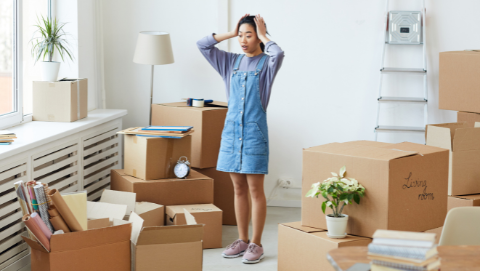The Mental Benefits of Decluttering
By Ashley Beckwith, Intern and Emma Parkhurst, Extension Assistant Professor
"Clutter isn’t just the stuff on the floor. It’s anything that gets between you and the life you want to be living” - Peter Walsh
There is something to be said about having a clean and organized work or living space. According to a study by Princeton University, researchers discovered that our environment can positively or negatively impact our ability to complete tasks as well as our overall mental health. If the physical space around us feels scattered, it’s likely our mental space will feel the same. A study by the University of Connecticut found that by removing or controlling clutter, we can directly reduce the stress that stems from the mess which can help us to feel happier, less anxious, and more confident in ourselves. Decluttering can also lead to the following mental health benefits:
- Boost your mood and help improve your physical health. The ability to complete physical activity while organizing can enhance creativity by allowing the mind to wander. Letting our mind go a little as we organize our clutter can help us relax mentally while our body is staying active. The combination of the two can boost our mood because we feel less stressed about what once was clutter, and we feel accomplished after seeing the progress!
- Sharpen your focus. Clutter is very messy and chaotic, so it is no wonder that we can have a tough time focusing. When your space is de-cluttered, it is much easier to obtain a sharper focus because what you see is in a specific place. The sense of organization helps your mind to be on track to complete tasks.
- Energize you into productivity mode. When you are decluttering you are problem solving, and therefore getting things done. You gain energy from the visual accomplishments of de-cluttering. Your gained energy can also help tackle other items on your to-do list!
- Relieve anxiety. When things are not organized or clean, it can often bring vast amounts of anxiety. You may feel constantly stressed, worried, or afraid of more clutter accumulating. To allow our minds to find some peace, decluttering can lift that weight and help us to think clearer and feel calmer.
Clutter can be overwhelming, but it can be removed or organized. One of my favorite strategies to control the clutter in my home is to incorporate decluttering into my every day or weekly routine. We implement a “ten-second tidy” each day to keep our everyday mess manageable and prevent clutter-induced overwhelm or anxiety. Here are some other tips to try:
- Start small! You do not need to declutter and clean everything at once. Think of one small area that you can go through each day. For example, today I will go through the bottom half of my closet and tomorrow I will go through one of my junk drawers. In a matter of weeks, you will notice a major difference in how organized you feel. It is important that we start small because when we don’t, it can be very difficult to find a starting point. Consider making a list of all the areas in your home that need to be de-cluttered and tackle one space each week.
- Ask a friend or family member to help you. If you find it difficult to start on your own, you can always invite others to either help you or just be there to keep you company. It can be difficult to ask, but most people are more than willing to help. Especially if you have a major project— the more help you have, the more you will feel that this project is accomplishable. Sometimes we need outside support!
- Always begin cleaning with a positive mind. There is no right way to declutter because we all have different needs. Put your mind into a state that will allow you to freely wander as you straighten up and organize. Know that once you do something and see that it is good enough, it is good enough. Shift your focus from perfectionism to simply fulfilling the action. Practice a positive mind with deep breathing and positive thoughts towards yourself, what you’re about to do, and then what you accomplish.
Remember, life can be stressful enough when you don’t have to spend hours cleaning and straightening. Consider using these tips to keep your clutter manageable and do what works best for you.
References:
Boyes, A. (2018). 6 Benefits of an Uncluttered Space. Psychology Today. https://www.psychologytoday.com/us/blog/in-practice/201802/6-benefits-uncluttered-space
Gordon, S. (2021). The Relationship Between Mental Health and Cleaning. Verywell Mind. https://www.verywellmind.com/how-mental-health-and-cleaning-are-connected-5097496
Deevoy, R. (2021). Why decluttering is good for your mental health. Calm-moment.https://www.calmmoment.com/living/why-decluttering-is-good-for-your-mental-health/
Lang, M., Krátký, J., Shaver, J.H., Jerotijević, D., & Xygalatas, D. (2015). Effects of anxiety on spontaneous ritualized behavior. Current Biology, 25(14), 1892-1897.
McMains, S., & Kastner, S. (2011). Interactions of top-down and bottom-up mechanisms in human visual cortex. Journal of Neuroscience, 31(2):587-97.


 Utah 4-H & Youth
Utah 4-H & Youth